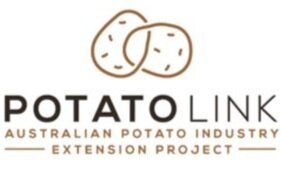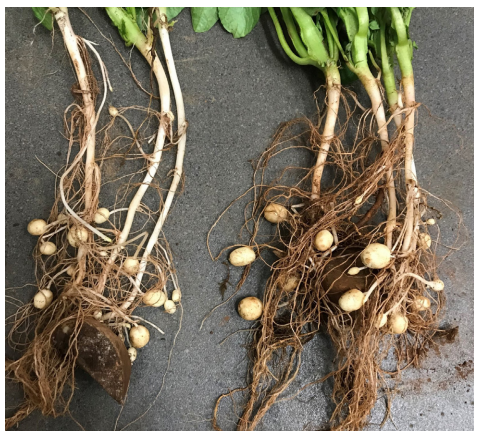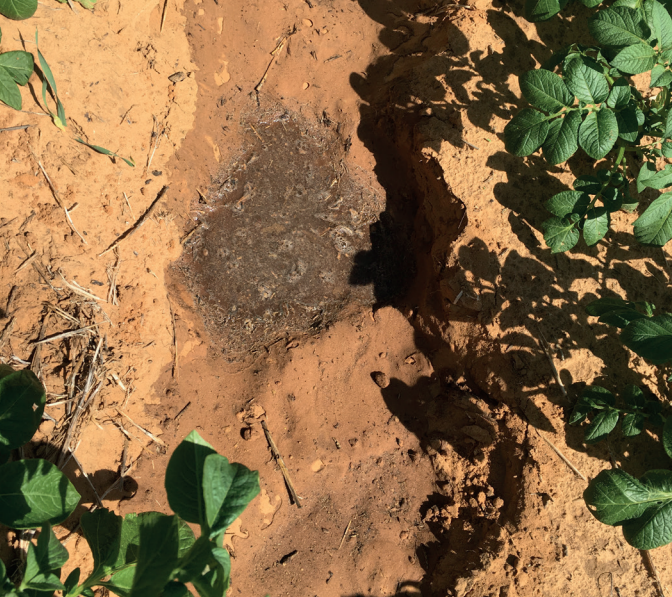Demo site results: Optimising Fertiliser use in North Motton, Tasmania
A PotatoLink demo with grower Coby Badcock tested four fertiliser strategies on a Tasmanian crop, comparing high-input vs sap-guided approaches. The results offer insights into nutrient timing, efficiency, and cost-effectiveness—proving that more fertiliser doesn’t always mean better yield.
PotatoLink demonstration: Using biologicals in a commercial farm setting
A recent PotatoLink demonstration trial at Springbank, Vic, investigated the impact of farm practices on the effectiveness of biologicals, including the application of fungicides, the influence of soil nutrient availability, and fertiliser applications. In Issue 10 of PotatoLink magazine you will find all the details of the trial as well as the results.
Soil Physics 101
Understanding and managing the interacting components of soil health - physical, biological and chemical factors - is essential to create robust and productive soils that are able to sustain commercial potato production. This PotatoLink magazine article examines some aspects of soil physical properties and how they impact agricultural practice (and how agricultural practices impact soil physical properties).
PotatoLink R&D Forum - 2023
PotatoLink held a research and development forum in Adelaide on 5 June 2023. The seven speakers covered a range of topics including diseases, irrigation, monitoring technology and more. Below are recordings of the presentations given on the day.
Management of potatoes under wet conditions
Three successive La Niña seasons have left prime potato growing areas waterlogged. Challenges for growers are evident at every stage, from managing seed, planting, crop management and storage. Paulette Baumbartl covers all the key points in this article in Issue 8 of PotatoLink magazine.
The changing nutrition needs of a growing crop
Knowing what your plants need and when is crucial to getting the most out of your crop. This factsheet covers the importance of soil tests, in-season tissue testing, how nutrients interact with each other and fertiliser application methods.
Smart farming using simple tech
In Issue 06 of PotatoLink magazine, Ryan Hall looks at the accessibility and mobility of technology available to growers in the form of drones, remote sensing and smartphone apps.
Potassium, specific gravity and getting the balance right
Potato plants take up large quantities of potassium with peak daily uptake reaching over 4 kg/ha/day. Supplying potassium is most important during stolon and tuber initiation, although maximum uptake occurs during tuber bulking. This PotatoLink magazine article includes information on supplying potassium to crops and how potassium has helped Canowindra, NSW potatoes.
Magnesium - the forgotten element?
Magnesium (Mg) is essential to plants. It is strongly involved in photosynthesis and transporting carbohydrates from leaves to roots, which is particularly important for tuber development. Yet, it may be overlooked within fertiliser programs focused on N, P and K. Read about the Mg mini trial in this PotatoLink magazine article.
Improving phosphorus uptake efficiency of potatoes
This Soil Wealth & Integrated Crop Protection case study examines the role of phosphorus availability and uptake in a potato crop throughout the growing season. It shares the results of a trial in north-west Tasmania of a new liquid phosphorus fertiliser applied to processing potatoes in P-fixing soils.
Soil Biology Master Class 2021 (Part 1 of 4): The fundamentals of soil biology
The first soil biology masterclass was delivered by Dr. Kelvin Montagu, looking at the linkage between key soil functions and soil biology, and the interactions between plant roots and soil biology.
De-mystifying the carbon story
Adrian James covers the current state of play of carbon in agriculture, carbon neutral farming and the use of farm carbon calculators. In addition he explores the opportunities in farm carbon offsets.
Precision agriculture for the potato industry - practical soil mapping and adoption
Watch this webinar presented by Frank Mulcahy to learn how soil mapping (EM38) can assist potato growers with better yields.
Potato R&D Forum 2021 Day 2 Recording: Soil health and disease management
Catch up on Day 2 of the Australian Potato R&D Forum 2021, which focused on soil health and disease management.
Exploring Spongospora suppressive soils in potato production
The diseases caused by Spongospora subterranea (tuber powdery scab and root hyperplasia) can cause significant yield and quality loss. Not all soils are equally susceptible to this disease. This 2020 report determined factors that resulted in Spongospora suppressive soils in New Zealand.
Salinity and potato production (Part 3 of 4): Managing hydrophobic soils in potato production
Explore the impact of hydrophobic soils on potato production and options for growers to assist with their management to improve potato yields.




















